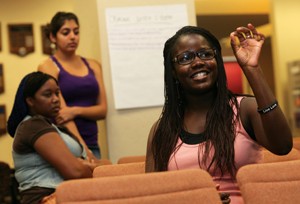Students gathered to discuss the issues of oppression, social injustice and institutional classism found in contemporary American society in the Center for Student Involvement and Leadership Tuesday evening.
The Social Justice Leadership workshop allowed students to explore and debate the causes of institutional oppression and the effects it has on people across the country.
“”An institution is something that is made or built by people,”” said Jennifer Hoefle, senior coordinator for the Social Justice workshop. “”So we are connected to it as people. We define institutional oppressions as policies, laws, rules, norms and customs enacted by organizations and social institutions that disadvantage some social groups and advantage other social groups.””
Institutionalized racism may not manifest itself in blatant ways sometimes, but it is still pivotal that society makes the effort to identify and eradicate such racism, said Tyler Bouchard, a biology senior.
“”I think it’s important to recognize these issues,”” he said. “”I feel like most people don’t really pay attention to them, or it doesn’t affect them, but they are a big part of America.””
The workshop, facilitated by Hoefle, allowed for students to explore the ways institutions manifest oppression by citing examples through personal experiences or observations. Hoefle paired students into groups, assigning them different institutions including education, health care, criminal justice, media and the workplace, and had them discuss the multiple ways in which those institutions support oppression.
“”When you look at white men as a group compared to white women as a group, women still make . . . 78 cents or 79 cents to the dollar that white men as a group make,”” Hoefle said. “”We are comparing groups of people, so of course you can find women like Oprah, who out-make everybody, and you can find white men who don’t make very much, but as a group . . . this is true.””
While accepting that racism is an institutionalized part of society may be difficult for some to admit to themselves, the numbers do not lie, Bouchard said.
“”There is no question about racism being a part of certain institutions,”” he said. “”I think there are a lot of things that are wrong with our society that creates racism.””
Participants of the workshop were given red markers to indicate racism or classism, and wrote how a given institution affects minorities and people under the poverty line.
Examples included perpetuating racial stereotypes in Hollywood films, ignorance of the costs of medical insurance, teacher expectations of women and minority students and the low funding and high authority of the police force.
Students were able to generate debate with one another about the validity of the arguments and future methods of prevention.
“”It’s all about raising awareness,”” Hoefle said. “”Students, everyone, need to be aware about issues such as race and class that affect everyone on a daily basis. We encourage everyone to participate.””
The leadership workshop series is offered through the university’s Social Justice Program, which offers opportunities and other workshop series for students to take part in and to discuss social problems that plague America. The leadership workshop series will be continued, in addition to separate social justice programs, with several more opportunities throughout the academic year.
Although the program regularly holds such workshops, students can still gain valuable knowledge from attending the program’s events, Bouchard said.
“”This is my first time here, and actually, it’s for a class, but I found what everyone had to say pretty interesting,”” he said. “”I think that this should be a bigger deal, or at least more people should know about it and learn about it too.””
Now it’s our turn
President Shelton is hosting a town hall meeting for UA students to discuss and ask about the UA Transformation Plan today from noon to 1:30 p.m. in the Tucson Room of the SUMC.









